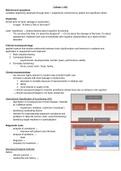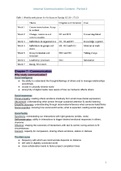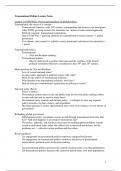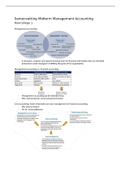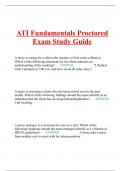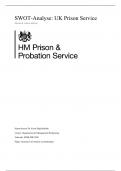PERSONAL DEVELOPMENT: TIME MANAGEMENT (1)
1. What is time management?
Time management
- The art of managing time effectively so that the right time is allocated to the right
activity
- It is not clock management
- It is self-management, it consist of managing, self-planning and goal setting to
achieve the desired results
Why is time management important?
- It helps to achieve your goals faster and easier, it improves your productivity
- It improves work-life balance
- It reduces stress, enhances your focus so you get more free time
- It improves the quality of your work
The nature of time
- It is an intangible resource
- It is a personal resource
- It is tricky by nature
2. Skills to become a better time manager
Skills
- Planning and prioritizing
- Avoid procrastination
- Set goals and deadlines
- Focus on task completion
1
,PERSONAL DEVELOPMENT: TIME MANAGEMENT (2)
1. Tools and techniques
Eisenhower The focus Pareto Pomodoro FLOW
method: funnel principle technique
planning and
prioritize
How to avoid procrastination?
- Eat the ugliest frog first
- Eat it now
- Don’t merely look at it, eat it
- When you feel overwhelmed, remember to BOOM
Habit building
Cue: your phone buzzes with a new text message
Craving: you want to know the contents of the
message
Response: grab your phone and read the text
Reward: you satisfy your craving to read the
message
→ grabbing your phone becomes associated with
your phone buzzing
4 laws of behavior change
- 1st law (cue): make it obvious
- 2nd law: (craving): make it attractive
- 3rd law (response): make it easy
- 4th law (reward): make it satisfying
2
, PERSONAL DEVELOPMENT: TIME MANAGEMENT (3)
1. Work-life balance
It involves the minimization of work-related stress and the establishing of a stable and
sustainable way to work while maintaining health and general well-being.
The duality of life
- Your personal life and your professional life: one facet doesn’t dominate the other
- It is important what you do while you’re working, but also what you do outside of
work: having hobbies or having methods for restoration
2. Stress management
What do we feel when we experience stress?
- Fear, worry, inability to relax, increased heart rate, difficulty in breathing, …
What is stress?
- A stressor is a specific challenge or demand
- Acute emotional or physical tension, your body goes into ‘alarm mode’
- Your nervous system: stress hormones
- Physiological changes: energy to respond
→ result of thousands of years of human evolution
The 4 responses to fear
Stress is designed for occasional situations
- Acute stress
- Chronic stress
● Chronic imbalance is a chronic energy shortage in our immune system
3
1. What is time management?
Time management
- The art of managing time effectively so that the right time is allocated to the right
activity
- It is not clock management
- It is self-management, it consist of managing, self-planning and goal setting to
achieve the desired results
Why is time management important?
- It helps to achieve your goals faster and easier, it improves your productivity
- It improves work-life balance
- It reduces stress, enhances your focus so you get more free time
- It improves the quality of your work
The nature of time
- It is an intangible resource
- It is a personal resource
- It is tricky by nature
2. Skills to become a better time manager
Skills
- Planning and prioritizing
- Avoid procrastination
- Set goals and deadlines
- Focus on task completion
1
,PERSONAL DEVELOPMENT: TIME MANAGEMENT (2)
1. Tools and techniques
Eisenhower The focus Pareto Pomodoro FLOW
method: funnel principle technique
planning and
prioritize
How to avoid procrastination?
- Eat the ugliest frog first
- Eat it now
- Don’t merely look at it, eat it
- When you feel overwhelmed, remember to BOOM
Habit building
Cue: your phone buzzes with a new text message
Craving: you want to know the contents of the
message
Response: grab your phone and read the text
Reward: you satisfy your craving to read the
message
→ grabbing your phone becomes associated with
your phone buzzing
4 laws of behavior change
- 1st law (cue): make it obvious
- 2nd law: (craving): make it attractive
- 3rd law (response): make it easy
- 4th law (reward): make it satisfying
2
, PERSONAL DEVELOPMENT: TIME MANAGEMENT (3)
1. Work-life balance
It involves the minimization of work-related stress and the establishing of a stable and
sustainable way to work while maintaining health and general well-being.
The duality of life
- Your personal life and your professional life: one facet doesn’t dominate the other
- It is important what you do while you’re working, but also what you do outside of
work: having hobbies or having methods for restoration
2. Stress management
What do we feel when we experience stress?
- Fear, worry, inability to relax, increased heart rate, difficulty in breathing, …
What is stress?
- A stressor is a specific challenge or demand
- Acute emotional or physical tension, your body goes into ‘alarm mode’
- Your nervous system: stress hormones
- Physiological changes: energy to respond
→ result of thousands of years of human evolution
The 4 responses to fear
Stress is designed for occasional situations
- Acute stress
- Chronic stress
● Chronic imbalance is a chronic energy shortage in our immune system
3


